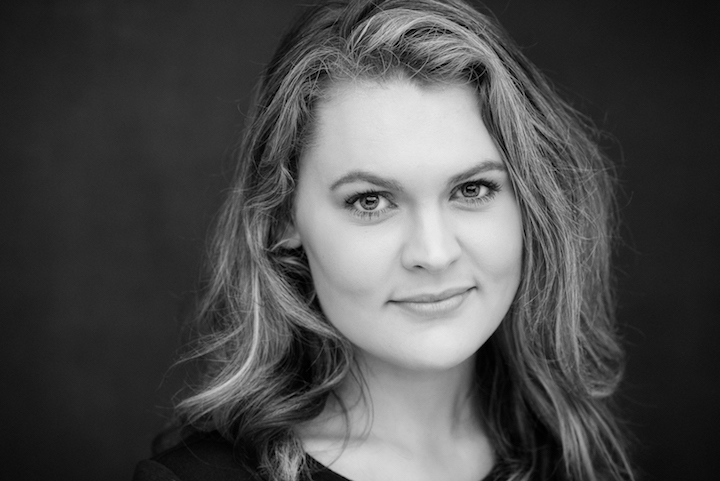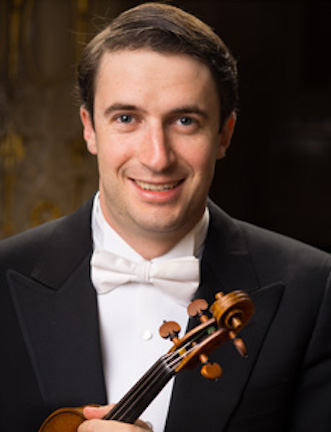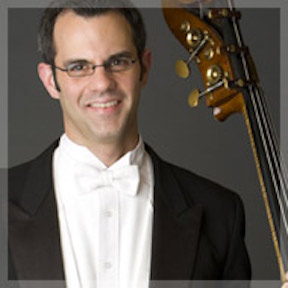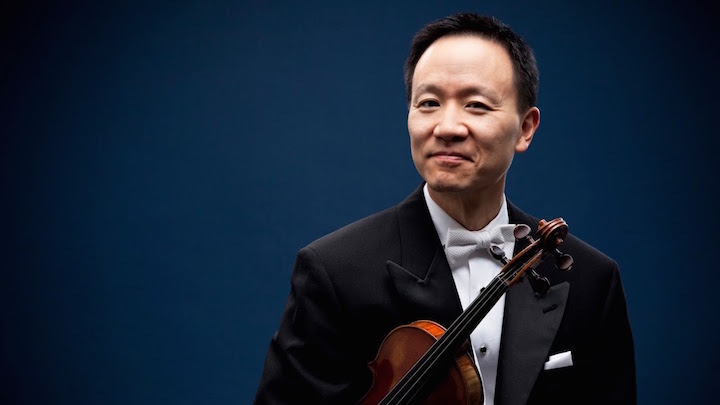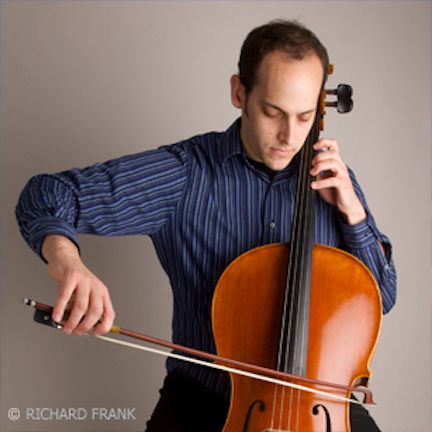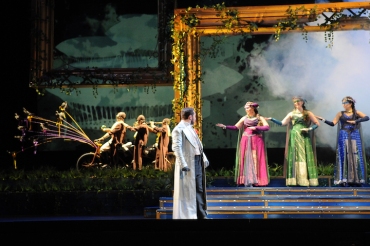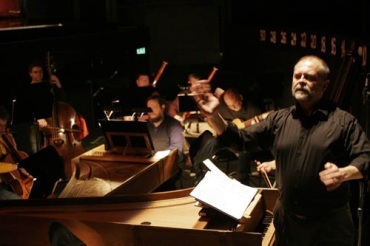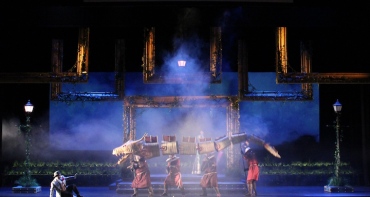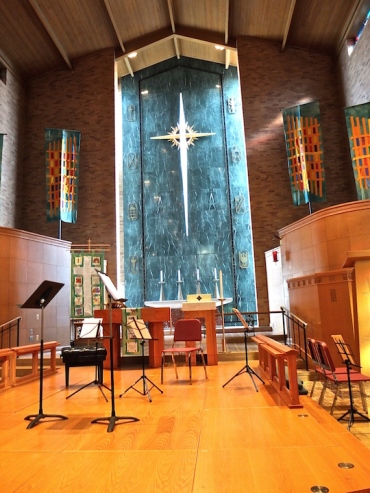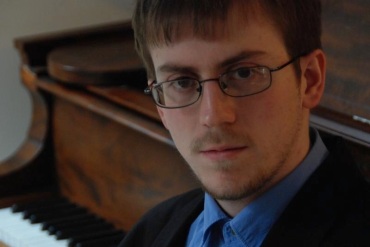The Well-Tempered Ear
Bach Around the Clock 2021 will be virtual again. It runs March 17-26, and will feature daily performances plus new activities
Leave a Comment
PLEASE HELP THE EAR. IF YOU LIKE A CERTAIN BLOG POST, SPREAD THE WORD. FORWARD A LINK TO IT OR, SHARE IT or TAG IT (not just “Like” it) ON FACEBOOK. Performers can use the extra exposure to draw potential audience members to an event. And you might even attract new readers and subscribers to the blog.
By Jacob Stockinger
The Ear has received the following announcement to post from violist Marika Fischer Hoyt – the founder, participant and artistic director of the annual Bach Around the Clock (BATC). It is one of the most enjoyable events in the area and celebrates the birthday of Johann Sebastian Bach (1685-1750, below).
It features performances by student, amateur and professional individuals and groups — local, regional and national. (Performance photos come from last year’s videos, thanks to Rich Samuels, who recorded and edited the WORT-FM radio show devoted to BATC 2020, which you can hear in the impressive 3-hour YouTube video at the bottom. Listen to it in its entirety or skip around.)
The Bach Around the Clock (BATC) Board of Directors is delighted to present the BATC 2021 Festival, a series of online and virtual events designed to make the joy of Bach’s music as widely available as possible.
Our theme this year is Building Bridges with Bach, and we look forward to expanding our activities to reach new performers and new audiences. (Below is pianist Vibhu Akella playing an electric keyboard.)
The 2021 Virtual Festival launches on Wednesday, March 17, with a concert by our Ensemble-In-Residence, Sonata à Quattro (below, in a photo by Barry Lewis). SAQ will present a program recorded in Luther Memorial Church, as part of the monthly Just Bach concert series.
BATC will add a new festival program every day for 10 days, through March 26, with all programs posted FREE on our home website at https://bachclock.com. (Below is the Webb Trio.)
Interested performers should visit the “Contact/Sign Up” page to submit their proposals and ideas.
BATC participants, who are located far and wide, have two options this year: they can pre-record their performances at home or elsewhere and submit them electronically; or they can request to perform in a BATC concert venue with a professional recording crew. (Below is cellist Derick Handley.)
We will provide keyboard players with the use of a concert-level piano, organ and harpsichord in a space roomy enough to safely accommodate small ensembles. (Below is harpsichordist Dan Sullivan.)
The resulting videos will be incorporated into one of the festival day’s free public programs, and will be available to the performers to keep. This option might be particularly attractive for high school seniors, looking to augment their college applications. (Below is clarinetist Brian Gnojek.)
Other new festival initiatives include Bach Chorale sing-alongs; evening Zoom receptions; mini-courses to help participants of all ages take part; and possibly a Guest Artist. More details will be announced closer to the festival.
The BATC Board hopes the 2021 Festival provides an outlet for musicians to share their talent and passion with the warmly appreciative local community.
Live music nourishes the soul of performer and audience member alike, and the transcendent, life-giving joy woven into the music of Johann Sebastian Bach is something we need now more than ever.
Tags: #10Days, #AtHome, #AudienceMember, #BachAroundtheClock, #BachChorale, #BaroqueMusic, #BarryLewis, #BlogPost, #BlogPosting, #BoardofDirectors, #BrassMusic, #ChamberMusic, #ChoralMusic, #ChristianaLiberis, #ChristianChurch, #ConcertSeries, #CoronavirusPandemic, #COVID-19, #ElectricKeyboard, #Ensemble-in-residence, #FacebookPost, #FacebookPosting, #FrenchHorn, #GuestArtist, #HighSchool, #HomeWebsite, #JacobStockinger, #JohannSebastianBach, #JustBach, #LiveMusic, #LutherMemorialChurch, #MarikaFischerHoyt, #MeadWitterSchoolofMusic, #MusicaAntiqua, #OnlineConcert, #OnlineFestival, #RecordedMusic, #RichSamuels, #SarahBrailey, #SignUp, #SonataaQuattro, #TheEar, #TheUW, #UniversityofWisconsin-Madison, #VirtualConcert, #VirtualFestival, #VocalMusic, #WindMusic, #WORT-FM89.9, #YouTubeChannel, #YouTubevideo, #ZoomMeeting, 10 days, 2021, accommodate, add, ages, amateur, announcement, annual, application, appreciative, area, around, Artistic director, Arts, at home, attractive, audience, augment, available, Bach, Bach Around the Clock, Bach chorale, Baroque, Barry Lewis, BATC, birthday, blog, Blog post, blog posting, Board of Directors, brass, bridge, building, celebrate, cellist, Cello, Chamber music, choral music, Chorale, Christian church, Christianity, church, clarinet, clarinetist, Classical music, closer, college, community, composer, Concert, concert series, concert-level, concerto, contact, coronavirus, courses, crew, daily, days, delight, designed joy, details, Early music, edit, electric, electric keyboard, electronically, elsewhere, enjoyable, enough, evening, event, ever, every day, everyday, expand, Facebook, far, festival, forward, founder, free, group, guest artist, hear, high school, home website, Horn, hour, idea, impressive, incorporate, individual, initiative, interested, Jacob Stockinger, Johann Sebastian Bach, Joy, Just Bach, keep, Keyboard, launch, life-giving, like, link, listen, live, live music, local, locate, Luther Memorial Church, march, Marika Fischer Hoyt, Mead Witter School of Music, member, mini-course, Music, Musica Antiqua, Musician, need, new, nourish, online, option, Orchestra, organ, organist, outlet, page, pandemic, pandemic playlist, participant, Passion, performer, photo, Pianist, Piano, play, playing, pre-record, present, professional, program, proposal, provide, public, reception, record, recorded, recorded music, recording, Rich Samuels, roomy, safely, Sarah Brailey, senior, seniors, share, sign-up, sing-along, skip, Sonata, Sonata à Quattro, soul, space, Student, submit, symphony, tag, talent, The Ear, theme, transcendent, trio, United States, University of Wisconsin-Madison School of Music, University of Wisconsin–Madison, UW, UW-Madison, venue, Viola, Violin, violist, virtual, virtual festival, vocal music, we, Website, wide, Wind, Wisconsin, WORT, year, YouTube, Zoom
Classical music: The eclectic fusion group Mr. Chair plays music by Stravinsky, Satie and others on Monday night in Spring Green
Leave a Comment
IF YOU LIKE A CERTAIN BLOG POST, PLEASE SPREAD THE WORD. FORWARD A LINK TO IT OR, SHARE IT or TAG IT (not just “Like” it) ON FACEBOOK. Performers can use the extra exposure to draw potential audience members to an event. And you might even attract new readers and subscribers to the blog.
By Jacob Stockinger
The Ear has received the following announcement from the Rural Musicians Forum:
Mr. Chair looks like a jazz quartet, sounds sometimes like a rock band, but in actuality is a contemporary classical music group in the guise of a modern band.
Classically trained musicians who are well versed in jazz, the players in Mr. Chair create a new sound using both acoustic and electric instruments.(You can hear Mr. Chair perform the original composition “Freed” in the the YouTube video at the bottom.)
The Rural Musicians Forum audience will have the chance to enjoy the soundscapes of this fascinating eclectic fusion group on this coming Monday night, Aug. 19, at 7:30 p.m. at Taliesin’s Hillside Theater (below) in Spring Green.
Members of Mr. Chair (below) are Professor Mark Hetzler, trombone and electronics; Jason Kutz, piano and keyboards; Ben Ferris, acoustic and electric bass; and Mike Koszewski, drums and percussion. All have close ties to the University of Wisconsin-Madison’s Mead Witter School of Music, where they also perform as an ensemble.
Mr. Chair’s compositions are long-form journeys, telling stories through sound by using and exploring the three pillars of music: melody, harmony and rhythm. Think cinematic, orchestral, surreal, romantic, emotional and gripping, and always equal parts dissonant and consonant. Their influences are far-reaching from classical, blues and rock to soul, funk, jazz and beyond.
For this concert, Mr. Chair will perform re-imagined excerpts from Igor Stravinsky’s Neo-Classical ballet masterpiece Pulcinella as well as music by Erik Satie and selections from their debut album, NEBULEBULA, which will be released on Thursday, Sept. 5, on vinyl, CD and digital streaming platforms.
The genre-bending quartet will perform in the beautiful Hillside Theater designed by Frank Lloyd Wright as part of his Taliesin compound. It is located at 6604 State Highway 23, about five miles south of Spring Green.
Admission is by free will offering, with a suggested donation of $15.
Tags: #BalletMusic, #BalletScore, #BenFerris, #BlogPost, #BlogPosting, #BluesMusic, #ChamberMusic, #ChamberMusician, #CompactDisc, #ContemporaryMusic, #DrumMusic, #EqualParts, #ErikSatie, #FacebookPost, #FacebookPosting, #FrankLloydWright, #FreewillOffering, #FunkMusic, #HillsideTheater, #IgorStravinsky, #JasonKutz, #JazzMusic, #MarkHetzler, #MeadWitterSchoolofMusic, #MikeKoszewski, #Mondaynight, #NewMusic, #PercussionMusic, #PulcinellaSuite, #RockandRoll, #RockBand, #RockMusic, #RuralMusiciansForum, #SoulMusic, #SpringGreen, #TheBlues, #TheEar, #TromboneMusic, #UniversityofWisconsin-Madison, #YouTubevideo, acoustic, admission, Album, Arts, audience, ballet, band, Baroque, Ben Ferris, blog, blues, CD, Chamber music, chance, cinematic, Classical, Classical music, classicalmusic, close, Compact Disc, composer, Composition, compound, Concert, consonance, consonant, contemporary, create, debut, design, digital, dissonance, dissonant, drum, eclectic, electric, electronics, emotional, ensemble, equal, equal parts, Erik Satie, explore, Facebook, fascinating, forum, forward, Frank Lloyd Wright, freed, funk, fusion, gripping, group, guise, harmony, highway, Hillside Theater, Igor Stravinsky, imagine, influence, instrument, Jacob Stockinger, Jason Kutz, Jazz, Keyboard, like, link, long-form, Madison, Mark Hetzler, masterpiece, Mead Witter School of Music, melody, member, Mike Koszewski, modern, Monday, Mr Chair, Music, Musician, neo-Classical, new, New Music, night, offering, orchestral, original, part, percussion, performer, Pianist, Piano, pillar, platform, players, post, posting, Pulcinella, Pulcinella Suite, Quartet, rhythm, Rock, rock and roll, rock band, Romantic, rual, rural, Rural Musicians Forum, share, soul, Sound, soundscape, Spring Green, state, stories, story, streaming, subscriber, surreal, tag, Taliesin, The Ear, tie, Trombone, United States, University of Wisconsin-Madison School of Music, University of Wisconsin–Madison, use, UW-Madison, vinyl, word, YouTube
Classical music: Bach Around the Clock 2019 is looking for performers of all kinds to play on March 2
1 Comment
IF YOU LIKE A CERTAIN BLOG POST, PLEASE SPREAD THE WORD. FORWARD A LINK TO IT OR, SHARE or TAG IT (not just “Like” it) ON FACEBOOK. Performers can use the extra exposure to draw potential audience members to an event.
By Jacob Stockinger
Do you like the music of Johann Sebastian Bach (below, followed by photos of performances from past years)?
Then attention individuals and groups!
Amateurs and professionals!
Students and teachers!
Young people and old!
Instrumentalists and singers!
Bach Around the Clock – the annual one-day festival to mark the birthday of composer Johann Sebastian Bach – is looking for performers for the 12 hours of celebration.
This year, the event takes place on Saturday, March 2.
Here is an official announcement with complete details about participating in and supporting the event:
Would YOU like to perform at Bach Around the Clock (BATC)?
Plan to join in the celebration of the 334th birthday of Johann Sebastian Bach (1685-1750).
Musicians — amateur and professional — are invited to perform their favorite piece by Bach.
To request a performance spot, go to the BATC website and click on “Contact Us” to find our online sign-up request form.
Tell us who you are, whether it’s you alone or in a group, what you would like to perform, what instrument(s) and the approximate amount of time you would like for your performance. We will get back in touch with you with complete details.
Here is a link: https://bachclock.com/
Performances will take place on Saturday, March 2, at St. Andrew’s Church, 1833 Regent St., Madison, from 10 a.m. until 10 p.m. It will be live-streamed on local radio stations and websites.
P.S. You can help keep this festival free and open to all! Bach Around the Clock welcomes donations to help meet the costs of offering this free community event. To make a secure online contribution, click below:
Bach Around the Clock is a 501(c)(3) non-profit organization; contributions are tax-deductible to the extent allowed by law.
The Ear, who finds the event instructive and enjoyable, wants to add that although he loves and appreciates performances of Bach’s works as they were originally intended, he especially enjoys unusual arrangements that show the plasticity and genius of Bach’s music. He loves bluegrass Bach, roots Bach, jazz Bach, fell Bach and more.
From past years, he remembers hearing Two-Part Inventions written for keyboard played by a bassoon and flute duo. (You can hear it in the YouTube video at the bottom.) Similarly, he found it entrancing when one of the suites for solo cello was played on a saxophone and another on an electric bass guitar.
The Ear loves such unexpected variety – and is sure that Johann Sebastian himself, who often borrowed from and transcribed his own works, would approve.
Tags: #AmateurMusician, #BachAroundtheClock, #BaroqueMusic, #BassoonMusic, #BlogPost, #BlogPosting, #BluegrassMusic, #ChamberMusic, #ChristianChurch, #CommunityEvent, #ElectricGuitar, #FluteMusic, #FolkMusic, #HarpsichordMusic, #JazzMusic, #JohannSebastianBach, #OldPeople, #PayPal, #PianoMusic, #ProfessionalMusician, #RockandRoll, #RockMusic, #RootsMusic, #SaxophoneMusic, #St.Andrew'sEpiscopalChurch, #SuiteforSoloCello, #Two-PartInvention, #YoungPeople, amateur, arrangements, Arts, audience, Bach, Bach Around the Clock, bagpipe, Baroque, bass, Bassoon, birthday, bluegrass, borrow, Cello, Chamber music, Christian, Christianity, church, Classical music, community, composer, concerto, cost, donation, Early music, electric, electric guitar, ensemble, Episcopal, event, festival, flute, folk, free, genius, group, groups, guitar, harpsichord, individual, instrument, instrumentalist, Jacob Stockinger, Jazz, Johann Sebastian Bach, Keyboard, like, link, live-stream, Madison, Madison Symphony Orchestra, Music, non-profit, old, Orchestra, Pay Pal, performer, photo, Pianist, Piano, plasticity, professional, Radio, Rock, rock and roll, rock music, roots music, Saxophone, share, singer, St. Andrew's Episcopal Church, stream, Student, Suite for solo cello, tag, tax, tax-deductible, taxes, Teacher, time, transcribe, transcription, Two-Part Invention, United States, University of Wisconsin-Madison School of Music, University of Wisconsin–Madison, Viola, Violin, vocal music, Website, Wisconsin, work, young people, YouTube
Classical music: A new blog about the future of classical music has been launched in Madison by Lydia Sewell. It is called “A View From the Stage” and features interviews with prominent musicians
5 Comments
By Jacob Stockinger
The Ear has received the following announcement to post:
As the classical music industry continues to shift and adapt to changing cultural patterns, many performers, administrators, educators, journalists, and music enthusiasts are tracking these changes and exploring best practices to keep the institution alive.
In December 2017, Madison native Lydia Sewell (below) – an accomplished violinist and daughter of Wisconsin Chamber Orchestra artistic director Andrew Sewell — launched a blog that seeks to address those issues in a comprehensive, timely fashion.
“A View From the Stage” features the voices of world-renowned classical musicians, educators and arts administrators and their thoughts on the future of classical music and symphony orchestras.
The blog arose out of Sewell’s research on the strike by the Pittsburgh Symphony Orchestra in 2016.
Says Sewell: “As a graduate student at Duquesne University prepping for auditions, I was trying to answer the question, ‘If orchestras like the PSO are struggling to survive, what does that mean for regional orchestras who don’t have the donor bases that the majors rely on?”
“A View from the Stage” currently features interviews with musicians including Noah Bendix-Balgely, concertmaster of the Berlin Philharmonic; Scott Pingel, principal bass of the San Francisco Symphony; David Kim, concertmaster of the Philadelphia Orchestra who performed this fall at the UW-Madison; and Eric Nowlin, principal viola of the Detroit Symphony, as well as administrators including Paul Hogle, Dean of the Cleveland Institute of Music, and critic and composer Gregory Sandow.
With more than 30 interviews to roll out in the coming months, Sewell plans to continue interviewing classical thinkers and document their perspectives in “A View From the Stage,” in hopes to initiate further conversations surrounding 21st-century musicianship, concert reinvention and the sustainability of symphony orchestras.
Here are links to featured interviews, with photos below the link:
Noah Bendix-Balgely: https://www.lydiasewell.com/aviewfromthestage/2017/8/4/noah-bendix-balgely
Scott Pingel: https://www.lydiasewell.com/aviewfromthestage/2017/8/4/scott-pingel
David Kim (photo by Ryan Donnell): https://www.lydiasewell.com/aviewfromthestage/2017/10/26/david-kim
Eric Nowlin:
Paul Hogle:
https://www.lydiasewell.com/aviewfromthestage/2017/10/27/paul-hogle
Gregory Sandow: https://www.lydiasewell.com/aviewfromthestage/2017/8/21/gregory-sandow
Mike Block:
https://www.lydiasewell.com/aviewfromthestage/2017/8/4/mike-block
Upcoming interviews include:
Steve Hackman (conductor, composer, arranger)
Rachel Barton Pine (violin soloist)
Tracy Silverman (electric violin soloist)
Kate Sheeran (Dean, Provost of San Francisco Conservatory)
Philip Setzer (Emerson String Quartet)
Aaron Dworkin (Founder of Sphinx, Detroit)
Stanford Thompson (Founder Play on Philly!)
Tags: #AndrewSewell, #AViewFromtheStage, #BerlinPhilharmonic, #ClevelandInstituteofMusic, #DetroitSymphony, #DuquesneUniversity, #EmersonStringQuartet, #LydiaSewell, #MadisonWisconsin, #MusicEducation, #PhiladelphiaOrchestra, #PittsburghSymphony, #PlayOnPhilly!, #RachelBartonPine, #SanFrancisco, #SanFranciscoConservatory, #SanFranciscoSymphony, #Sphinx, #TracySilverman, #UniversityofWisconsin, #UniversityofWisconsin-Madison, #WisconsinChamberOrchestra, arranger, Arts, Arts Administration, Bach, Baroque, bass, Beethoven, Cello, Chamber music, choral music, Classical music, classicalmusic, Compact Disc, composer, concertmaster, concerto, conductor, critic, culture, dean, Detroit, Education, electric, electric violin, Emerson String Quartet, Franz Schubert, graduate, graduate student, interview, Jacob Stockinger, Johann Sebastian Bach, journalism, Ludwig van Beethoven, Madison, Mozart, Music, Music education, Orchestra, pattern, performer, Philip Setzer, provost, regional, San Francisco Conservatory of Music, soloist, strike, struggle, Student, survival, symphony, think, thinker, United States, University of Wisconsin-Madison School of Music, University of Wisconsin–Madison, Viola, Violin, vocal music, Wisconsin, Wisconsin Chamber Orchestra, Wolfgang Amadeus Mozart
Classical music: Mozart’s music requires the rhythms of both speech and dance, says maestro Gary Thor Wedow, who will also restore lost libretto text when he conducts two performances of “The Magic Flute” this weekend for the Madison Opera. Here is Part 2 of his interview with The Ear.
Leave a Comment
By Jacob Stockinger
The Madison Opera will stage Wolfgang Amadeus Mozart’s The Magic Flute this Friday night, April 21, at 8 p.m. and this Sunday afternoon, April 23, at 2:30 p.m. in Overture Hall of the Overture Center. (Production photos are courtesy of the Arizona Opera from which the Madison Opera got the sets and costumes for its production.)
Yesterday’s post was the first of two parts. It has a plot synopsis and links to more information about the cast and production.
Here is a link to Part 1:
The opera runs about 2 hours and 45 minutes with one intermission.
Tickets are $18 to $130.
“The Magic Flute” will be sung in German with English supertitles.
For more about the production and cast, go to:
http://www.madisonopera.org/performances-2016-2017/the-magic-flute/
And also go to:
http://www.madisonopera.org/performances-2016-2017/the-magic-flute/cast/
Here is Part 2 of The Ear’s recent email interview with conductor Gary Thor Wedow (below, conducting in an orchestra pit):
Are there certain “tricks” or “secrets” that you try to bring to conducting Mozart? Have you conducted “The Magic Flute” before? Do Mozart’s operas in general and this opera in specific present challenges? Where do you place the opera musically, both compared to other operas in general and in regard to its place in Mozart’s work?
I feel keenly that Mozart and all 18th-century music (probably continuing to this day) is either based on a rhetorical idea or a dance form; that music is either speaking or dancing. This style of music is “pre-French Revolution,” so No Two Notes are Created Equally! The lilt of language or the buoyancy of the dance has to infuse every moment; hierarchy and shape prevail.
I’ve been fortunate to have conducted The Magic Flute frequently, in many varied productions; it’s always been a part of my musical life. Because it’s a fairy tale, it lends itself to inventive and imaginative productions. Stage director Dan Rigazzi’s production (below) for Madison Opera is a whimsical one, influenced by the surrealist painter Magritte, steampunk and more, all rolled into one beautiful show.
Mozart was fascinated with German Singspiel, as it was opera in the language of the people. The Magic Flute is his masterpiece in this genre, though there are earlier works. There is the early Zaide – incomplete, but filled with gorgeous, innovative music –and also the more mature, sumptuous and comic The Abduction from the Seraglio; they are both rich and entertaining pieces.
The Magic Flute, I feel, has a special place in the opera repertoire for several reasons: its Masonic connections that were very important to Mozart, the drama, and its central themes that trace themselves back to ancient Egypt.
It also is a brilliant combination of comedy and deep spiritual drama in the guise of a heroic rescue tale. It uses an incredibly wide range of the most beautiful music written in every major genre: sacred music, opera seria, bel canto, folk song and complex Baroque counterpoint.
What would you like listeners to pay special attention to in the music of “The Magic Flute”?
I would say “Hang on!” Whatever style of music we are in, we are going to switch gears in a fairly short time. It’s a roller coaster, an Ed Sullivan Show, American Idol, and the Barnum and Bailey Circus all rolled into one.
This is your third time conducting at Madison Opera. Do you have an opinion about Madison musicians and audiences?
My previous two experiences in Madison have been the Opera in the Park concerts in 2012 and 2016 (below). These have been among the most sublimely satisfying moments of my musical life: a cornucopia of music played by this brilliant symphony orchestra with great singers.
The audiences have been magically focused and involved; the players are magnificent, dedicated musicians, and the community is very supportive of Madison Opera. It’s electric.
Is there anything else you would like to say about the music or this performance?
Magic Flute devotees might be startled to hear some new text in these performances, particularly in Tamino, Pamina and Sarastro’s arias and the duet with Pamina and Papageno. “Bei Männern” is now “Der Liebe.” (You can hear it in the YouTube video at the bottom.)
Let me explain by telling you a mystery story. After Mozart died, Constanze was desperate for money. Mozart’s Flute manuscript conducting score belonged to Schikaneder, the librettist and producer, but it seems that Constanze had another original score: the first original manuscript, which she then sold to a nobleman who eventually allowed it to be published.
This must have been a “composing score” that Mozart wrote first, before making the conducting score with the help of his assistant. The text deviates in several sections in notable ways. Probably Schikaneder, perhaps assisted by his Masonic brothers, “improved” the text, but Mozart had already shaped his music to the first text.
In most sections the differences are minimal and the new text was indeed an improvement. But in some cases I feel the original text was what inspired Mozart to write and orchestrate the way he did. Our marvelous singers have generously agreed to make the changes and I think we will all see how it fits the music so much better.
Sadly, Constanze’s manuscript was lost in the wars, but many scholars had already seen it and considered it to be genuine. I love how it shows how fluid the creative process is and how it spurs us to look anew at Mozart’s creative process.
On with the show!
Tags: 18th century, Abduction From the Seraglio, American idol, ancient, aria, Arizona Opera, Arts, Barnum and Bailey, Baroque, bel canto, choral music, circus, Classical music, comedy, community, conductor, Costanze Mozart, costumes, counterpoint, creative process, creativity, dance, drama, duet, Ed Sullivan, Egypt, electric, email, folk song, French Revolution, Gary Thor Wedow, genre, German, heroic, idea, innovative, interview, Jacob Stockinger, Juilliard, Juilliard School, language, libretto, link, Madison, Madison Opera, Madison Symphony Orchestra, Maestro, magic, Magritte, manuscript, Masonic, Masons, money, Mozart, msi, Music, mystery, opera, opera buffo, Opera in the Park, opera serio, Orchestra, Overture Center, painter, People, pit, producer, repertoire, rhetoric, roller coaster, sacred, Schikaneder, score, secrets, sets, show, singer, singspiel, speaking, speech, spiritual, steampunk, story, surrealism, surrealist, symphony, text, The Magic Flute, tricks, United States, University of Wisconsin-Madison School of Music, University of Wisconsin–Madison, vocal music, war, Wisconsin, Wolfgang Amadeus Mozart, YouTube, Zaide
Classical music: The acclaimed Willy Street Chamber Players announces its second summer season. Plus, this afternoon is your last chance to hear Madison Opera’s production of “The Tales of Hoffmann”
Leave a Comment
ALERT: This afternoon at 2:30 p.m. in Overture Hall of the Overture Center is your last chance to hear the Madison Opera‘s production of Jacques Offenbach‘s “The Tales of Hoffmann.”
Here are two preview posts that appeared here:
Here is a review written by Greg Hettmansberger for his blog WhatGregSays and Madison Magazine:
https://whatgregsays.wordpress.com/2016/04/16/making-a-spectacle-of-themselves/
And here is a review by Lindsay Christians for The Capital Times:
By Jacob Stockinger
No new classical music group generated more great buzz last year than The Willy Street Chamber Players. And that enthusiasm was shared by The Ear, who can’t recall hearing anyone or anything being negative about the group’s inaugural season.
Here is a link to one rave review, written by John W. Barker for this blog, that focused on astounding performance of the famous Octet by Felix Mendelssohn and a Brandenburg Concerto No. 3 by Johann Sebastian Bach:
A friend of The Ear who plays with the Willy Street Chamber Players (below) sends the following word:
Newcomers to the Madison classical music scene, the critically acclaimed group The Willy Street Chamber Players, will be returning to the stage for a second season this July.
The group will perform four concerts at Immanuel Lutheran Church (below), 1021 Spaight St., and season tickets are available now.
Here is a link to the updated events page:
http://www.willystreetchamberplayers.org/events1.html
This summer’s concerts will include fresh performances of time-honored classics. They include the Clarinet Quintet by Wolfgang Amadeus Mozart and the fiery “Souvenir de Florence” by Peter Ilyich Tchaikovsky.
The season will also include works that will be new to many Madison audience members.
Guest artists include violinist Suzanne Beia (below top) of the UW-Madison’s Pro Arte Quartet, the Madison Symphony Orchestra and the Wisconsin Chamber Orchestra; clarinetist Joe Morris (below middle), who is leaving the Madison Symphony Orchestra; and UW-Madison graduate student pianist Thomas Kasdorf (below bottom).
New this season will be a performance given in partnership with the Madison Museum of Contemporary Art on the evening of Friday, July 22, 2016.
That’s when the Willy Street Chamber Players will present the monumental work, “Black Angels,” composed by George Crumb (below) for electric string quartet, in what promises to be an unforgettable performance.
Written in response to the Vietnam War, this avant-garde work requires players to amplify their instruments, speak with their mouths, perform with extended techniques, play on crystal glasses and more. (You can hear Part 1 in the YouTube video at the bottom.)
In the meantime, you can hear the group live on Wisconsin Public Radio‘s Midday Show with Norman Gilliland (below) on this Thursday, April 21, at noon. This special broadcast will be performed in front of a live studio audience in celebration of the Midday Show’s 25th anniversary.
Visit www.willystreetchamberplayers.org for 2016 season details, tickets and more.
Tags: Arts, Bach, Baroque, Black Angels, Brandenburg Concerto, Cello, Chamber music, Classical music, electric, Franz Schubert, George Crumb, Jacob Stockinger, Johann Sebastian Bach, Madison, Madison Museum of Contemporary Art, Madison Opera, Madison Symphony Orchestra, Mendelssohn, Midday, Mozart, Music, Norman Gilliland, Octet, Offenbach, opera, Piano, Pro Arte Quartet, Pyotr Ilyich Tchaikovsky, quintet, String quartet, symphony, Tales of Hoffmann, The Capital Times, United States, University of Wisconsin-Madison School of Music, University of Wisconsin–Madison, Vietnam, Vietnam War, Viola, Violin, Wisconsin, Wisconsin Chamber Orchestra, wisconsin public radio, Wolfgang Amadeus Mozart, YouTube
- June 2024
- May 2024
- April 2024
- March 2024
- February 2024
- January 2024
- December 2023
- November 2023
- October 2023
- September 2023
- August 2023
- July 2023
- June 2023
- May 2023
- April 2023
- March 2023
- February 2023
- January 2023
- December 2022
- October 2022
- September 2022
- June 2022
- May 2022
- April 2022
- March 2022
- July 2021
- June 2021
- May 2021
- April 2021
- March 2021
- February 2021
- January 2021
- December 2020
- November 2020
- October 2020
- September 2020
- August 2020
- July 2020
- June 2020
- May 2020
- April 2020
- March 2020
- February 2020
- January 2020
- December 2019
- November 2019
- October 2019
- September 2019
- August 2019
- July 2019
- June 2019
- May 2019
- April 2019
- March 2019
- February 2019
- January 2019
- December 2018
- November 2018
- October 2018
- September 2018
- August 2018
- July 2018
- June 2018
- May 2018
- April 2018
- March 2018
- February 2018
- January 2018
- December 2017
- November 2017
- October 2017
- September 2017
- August 2017
- July 2017
- June 2017
- May 2017
- April 2017
- March 2017
- February 2017
- January 2017
- December 2016
- November 2016
- October 2016
- September 2016
- August 2016
- July 2016
- June 2016
- May 2016
- April 2016
- March 2016
- February 2016
- January 2016
- December 2015
- November 2015
- October 2015
- September 2015
- August 2015
- July 2015
- June 2015
- May 2015
- April 2015
- March 2015
- February 2015
- January 2015
- December 2014
- November 2014
- October 2014
- September 2014
- August 2014
- July 2014
- June 2014
- May 2014
- April 2014
- March 2014
- February 2014
- January 2014
- December 2013
- November 2013
- October 2013
- September 2013
- August 2013
- July 2013
- June 2013
- May 2013
- April 2013
- March 2013
- February 2013
- January 2013
- December 2012
- November 2012
- October 2012
- September 2012
- August 2012
- July 2012
- June 2012
- May 2012
- April 2012
- March 2012
- February 2012
- January 2012
- December 2011
- November 2011
- October 2011
- September 2011
- August 2011
- July 2011
- June 2011
- May 2011
- April 2011
- March 2011
- February 2011
- January 2011
- December 2010
- November 2010
- October 2010
- September 2010
- August 2010
- July 2010
- June 2010
- May 2010
- April 2010
- March 2010
- February 2010
- January 2010
- December 2009
- November 2009
- October 2009
- September 2009
- August 2009
Archives
- 2,495,322 hits
Blog Stats
Recent Comments
Tags
#BlogPost #BlogPosting #ChamberMusic #FacebookPost #FacebookPosting #MeadWitterSchoolofMusic #TheEar #UniversityofWisconsin-Madison #YouTubevideo Arts audience Bach Baroque Beethoven blog Cello Chamber music choral music Classical music Compact Disc composer Concert concerto conductor Early music Facebook forward Franz Schubert George Frideric Handel Jacob Stockinger Johannes Brahms Johann Sebastian Bach John DeMain like link Ludwig van Beethoven Madison Madison Opera Madison Symphony Orchestra Mead Witter School of Music Mozart Music New Music New York City NPR opera Orchestra Overture Center performer Pianist Piano post posting program share singer Sonata song soprano String quartet Student symphony tag The Ear United States University of Wisconsin-Madison School of Music University of Wisconsin–Madison Viola Violin vocal music Wisconsin Wisconsin Chamber Orchestra wisconsin public radio Wolfgang Amadeus Mozart YouTube


















